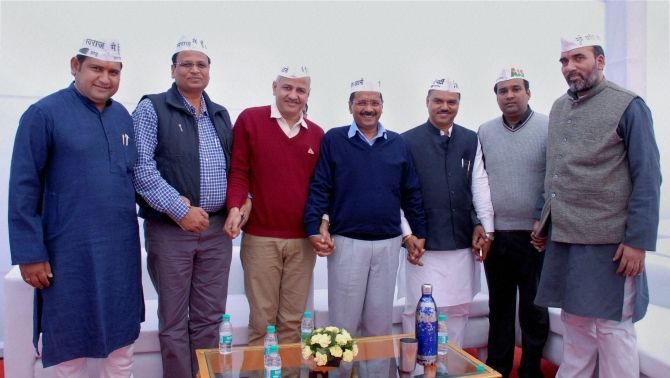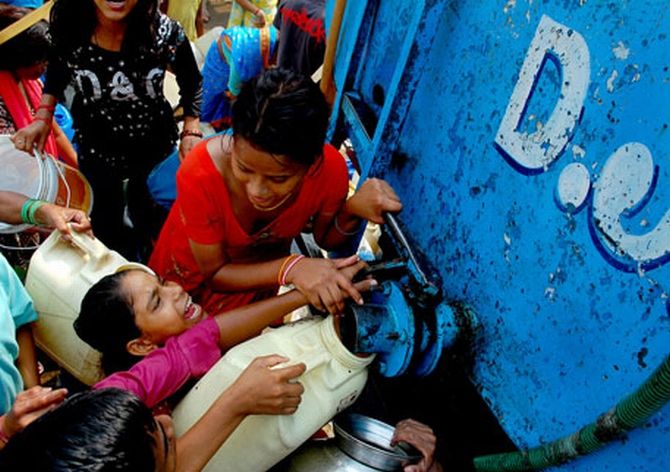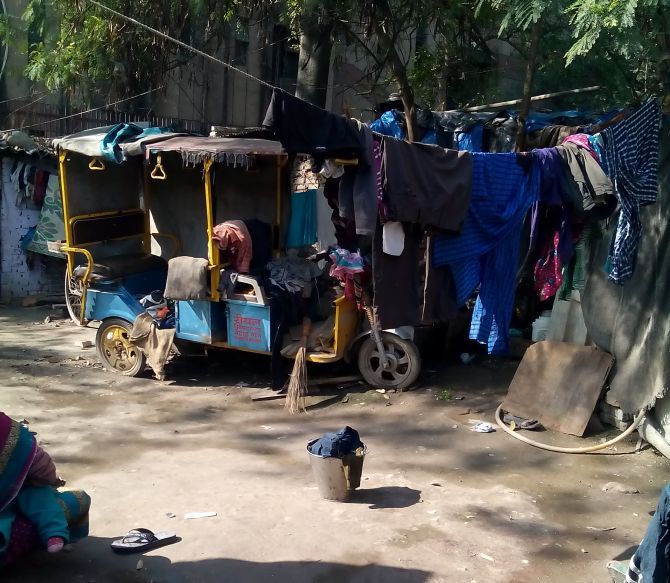A week after taking office, Arvind Kejriwal and his ministers have ambitious promises to keep.
Rashme Sehgal discusses the challenge that confront the Delhi chief minister.
 The eyes of 20 million Delhites are focused on Delhi Chief Minister Arvind Kejriwal.
The eyes of 20 million Delhites are focused on Delhi Chief Minister Arvind Kejriwal.
On being voted to power with a thumping majority, will Kejriwal and his young and largely inexperienced team deliver on crucial electoral promises, keeping in mind that his Aam Aadmi Party had prepared a 70-point action plan as part of its election manifesto.
To prove his commitment to providing 700 litres of free water per person per day, one of the first steps the chief minister took was to order government tankers to provide free water to the water-deprived colony of South Delhi's Sangam Vihar.
The sight of the water tankers plying through the narrow lanes of this colony served to reinforce the faith of its residents, many of whom declared that it was for the first time that they had received free water despite having lived in the colony for 15 years.
Gita Devi, a resident of Sangam Vihar and a mother of three, says with a happy smile, "If we continue to get a regular supply of water, then our faith in AAP will get further strengthened."
Professor Vikram Soni, a physicist at Jamia Milia University, points out, "Delhi's water consumption is presently 850 million cubic metre of water per year of which a large amount comes from the Ganga, Tehri Dam, Beas-Bhakra and the Yamuna river."
"If we go by the AAP promise of 700 litres of free water per person per day, it works out to 20,000 litres of water for one family of five members in one month," he adds.
 Extending the calculation further, Soni says, "Forty per cent of Delhi's population presently lives in water deprived colonies, whether these be jhuggis, slums or unauthorised colonies, all of which are presently making do with private tankers."
Extending the calculation further, Soni says, "Forty per cent of Delhi's population presently lives in water deprived colonies, whether these be jhuggis, slums or unauthorised colonies, all of which are presently making do with private tankers."
These four million families with an average household of five would require 400 million cubic metre of water per annum.
To provide so much water, the Delhi government would have to build up an infrastructure whereby one million cubic metres of water would have to be distributed for which, even if they hired very large tankers with a capacity of 1,000 litres per tanker, on an average of eight trips a day, would at the most provide 80 cubic metres, points out Professor Soni. Tanker capacity in Delhi averages 1,000 litre per tanker.
AAP leaders talk of setting up GPS-enabled tanker distribution networks along the pattern of the public transport systems in the West, but the key issue is that Delhi roads, which are spilling at the seams, are hardly in a position to sustain the plying of such a large and unwieldy additional fleet, given that its fleet of 300 buses have to fight for road space most of the time.
Deputy Chief Minister Manish Sisodia has stressed the importance of providing piped clean drinking water and building a proper sewage system as also reviving non-functional drinking water plants in Dwarka and Bawana along with drawing water from the Munak canal.
Presently, it is estimated that piped water and sewerage facilities will be required for these four million households. This is expected to cost over Rs 40,000 crores (Rs 400 billion). Kejriwal remains confident of his ability to raise funds, declaring that no government has ever faced a paucity of funds.
Professor Soni believes the practical way out for the Kejriwal government is to bring down the promised water subsidy to 60 litres of free water per day. `This will make the subsidy much more viable and manageable, he believes.
Halving power tariff may prove another bed of thorns. For one, Prime Minister Narendra Modi has already muddied the waters asking how parties in states that depend on other states for their power supply can make free electricity into a poll issue. Modi was speaking in the context of how most state utilities are already tottering on the brink of financial disaster.
On the toes of the prime minister's statement, the Delhi Electricity Regulatory Commission declared that it is expected to order a 10 to 15 per cent hike in tariff to be paid to discoms because of rising costs.
Activist Dunu Roy, director, Hazard Centre, who has been monitoring the power situation, points out that the power subsidy is presently being provided to all those who consume between 0 and 400 units of power.
"Those who use up to 200 units pay tariff at Rs 4 while those using 1,200 units pay a higher tariff of Rs 8.75 and this figure increases further as the consumption rises, says Roy.
The average rate at which utilities purchase power, he says, is Rs 4. "These companies also incur distribution costs which must be factored in. So, already power at Rs 4 per unit is being subsidised and if it is cut down to Rs 2, then the subsidy will go up even further," adds Roy.
Resident Welfare Associations have filed a case in the Delhi high court, asking why middle and high end consumers are being asked to subsidise the poor. "The numbers do not favour any further subsidies," Roy points out.
AAP has been pressing for a CAG audit of all power companies including BSES, a subsidiary of the Anil Dhirubhai Ambani Group, and Tata Power Delhi Distribution. Both companies supply power to the capital and AAP alleges both companies manipulate expenses by showing excessive coal and fuel consumption.
"It is this route being used to justify higher tariff slabs," an AAP leader said.
The AAP manifesto states that discoms must purchase power from economical sources though it does not specify who will sell them power at cheaper rates.
Its other focus is for Delhi to set up its own power station which can generate up to 6,200 MW. This is a long-term suggestion which will take at least five years to execute.
 Healthcare and regularisation of illegal colonies are other areas of key priority for the government.
Healthcare and regularisation of illegal colonies are other areas of key priority for the government.
Kejriwal has to ensure that he is serious about fulfilling his party's promise to provide 40,000 new hospital beds including 4,000 specialised maternity beds and better run primary health centres and dispensaries.
He has also promised to help increase the capital's plunging sex ration figures.
Professor Ritupriya Mehrotra, a community health specialist at Jawaharlal Nehru University, believes these health initiatives are do-able if the AAP government has the will and commitment.
"Already, he has said that he will increase the intake of doctors and paramedical staff in hospitals and has banned the removal of all contractual staff in order to help develop a greater sense of commitment," says Professor Mehrotra.
Regularisation of colonies and stoppage to indiscriminate demolition of jhuggi-jhopdis features among Kejriwal's priorities. In-situ rehabilitation of slum dwellers within one year of coming to power is another promise to help make the national capital a slum-free city.
The chief minister also wants to step up action on the safety and security of women and is determined to take stringent administrative measures in order to bring down the city's infamous record of rape cases.
Compulsory registration of cases by the Delhi police, adequate street lighting, ensuring last-mile connectivity and installation of CCTVs are some solutions the party has promised.
Politicians privately question whether freebies including guaranteed minimum wages, free WiFi connectivity, hundreds of thousands of CCTV cameras and 800,000 new jobs are in the realm of the do-able.
They fear that with Kejriwal having raised the bar on electoral promises, if such freebies gets repeated in future elections, the revenues of state governments may take a further hit.
Images: Top: Delhi Chief Minister Arvind Kejriwal and his ministers Manish Sisodia, Gopal Rai, Jitendra Tomer, Satyendra Jain, Asim Ahmed Khan and Sandeep Kumar. Photograph: PTI Photo
Middle: Residents of Govindpuri slum fight over water from a Delhi Jal Board tanker that empties in minutes. The slum colony has no regular water supply or sanitation facilities. Photograph: Sayantan Bera
Bottom: Arvind Kejriwal's government will need to deliver on its promise of creating more jobs for the youth, if it wants to build faith among poor voters, a resident of Trilokpuri earlier told Rediff.com Photograph: Upasna Pandey











 © 2025
© 2025